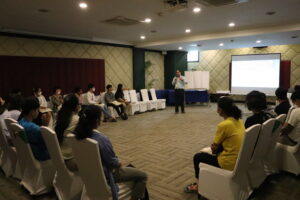ការប្រើប្រាស់វិទ្យាសាស្ត្រទិន្នន័យដើម្បីកែលម្អសេវាសាធារណៈ
ក្រសួងអប់រំ យុវជន និងកីឡាកម្ពុជា បានបង្កើតសៀវភៅសិក្សាថ្មីសម្រាប់សិស្សានុសិស្សថ្នាក់ទី ១ ដល់ទី ៣ ដើម្បីបង្កើនអត្រាអក្ខរកម្មក្នុងចំណោមកុមារថ្នាក់ដំបូង បង្កើតការស្រឡាញ់អំណានតាំងពីតូច និងលើកកម្ពស់គុណភាពអប់រំនៅកម្ពុជា។ នៅក្នុងកម្មវិធី កម្ពុជា អាយស៊ីធីខែម ២០២២ អ្នកចូលរួមមានឱកាសស្តាប់លោក ឆន ឆៃយុទ្ធ ប្រធានផ្នែកតាមដាន វាយតម្លៃ និងសិក្សា (MEL) នៃវិទ្យាស្ថានស្រាវជ្រាវ RTI និយាយអំពីការប្រើប្រាស់វិទ្យាសាស្ត្រទិន្នន័យដើម្បីកែលម្អសេវាសាធារណៈ។ ការធ្វើបទបង្ហាញនេះផ្តោតលើជំនាញអានសម្រាប់សិស្សានុសិស្សនៅថ្នាក់ដំបូង និងមានអ្នកចូលរួមចំនួន ២៩ នាក់ ក្នុងនោះ ១០ នាក់ជាស្ត្រី។

ការវាយតម្លៃការអានថ្នាក់ដំបូង (EGRA) បង្កើតឡើងក្នុងឆ្នាំ ២០០៦ ដើម្បីវាយតម្លៃជំនាញអានរបស់កុមារ។ វាគឺជាឧបករណ៍ដែលអាចទុកចិត្តបានក្នុងការវាស់ស្ទង់ការរីកចម្រើននៃជំនាញអានរបស់កុមារ ដែលមានមុខងារដូចជា ការកំណត់ចំណេះដឹងកុមារពិការអានអក្សរអក្ខរក្រម វាក្យសព្ទ និងការអានដើម្បីយល់ដឹង។ ការវាយតម្លៃដំបូងអំពីសមត្ថភាពអានរបស់កុមារមានសារៈសំខាន់ណាស់ ពីព្រោះសិស្សដែលរៀនអានតាំងពីថ្នាក់ដំបូង មានឱកាសខ្ពស់ក្នុងការទទួលបានជោគជ័យនៅបឋមសិក្សា។ ការបង្កើនការយល់ដឹងក្នុងការអានកាន់តែពិបាកនៅពេលដែលសិស្សធំឡើង ដែលអាចបណ្តាលឱ្យមានអត្រាបោះបង់ការសិក្សាខ្ពស់។
អង្គការជាង ៣០ បានប្រើប្រាស់ EGRA នៅក្នុងប្រទេសជាង ៧០ និង ភាសាចំនួន ១២០ ភាសា។ EGRA សម្របខ្លួនទៅនឹងអ្នកប្រើប្រាស់ដែលមានកម្រិតការយល់ដឹងពីការអានខុសៗគ្នា អាយុ ភាសា និងថ្នាក់រៀននៅក្នុងប្រទេសនីមួយៗ ដែលធ្វើឱ្យវាក្លាយជាឧបករណ៍ដែលមានលក្ខណៈចម្រុះ និងអាចប្ដូរតាមក្នុងបរិបទផ្សេងៗគ្នា។
កម្មវិធី EGRA នៅឆ្នាំ ២០១៨ បានបង្ហាញថា សិស្សជាងពាក់កណ្តាលនៃសិស្សថ្នាក់ទី១ អានព្យញ្ជនៈ២០តួ និងស្រៈ១៩តួ មិនបានត្រឹមត្រូវ។ អង្គការក្រៅរដ្ឋាភិបាលជាច្រើនបានធ្វើអន្តរាគមន៍ក្នុងការឆ្លើយតបទៅនឹងបញ្ហានេះ ប៉ុន្តែការអនុវត្តនៃសកម្មភាពផ្សេងៗគ្នានៅក្នុងសាលារៀន អាចពិបាកក្នុងការតាមដាន និងវាយតម្លៃ។ ដើម្បីដោះស្រាយបញ្ហានេះ ក្រសួងអប់រំ យុវជន និងកីឡា សហការជាមួយដៃគូអភិវឌ្ឍន៍ និងអង្គការក្រៅរដ្ឋាភិបាលចំនួន១៥ បានអនុវត្តកម្មវិធី Komar Rien Komar Cheh ជាកម្មវិធីទូទាំងប្រទេសដែលមានការណែនាំសម្រាប់គ្រូបង្រៀនដែលផ្តល់មុខវិជ្ជាស្នូល សៀវភៅសិស្ស និងសម្ភារៈសិក្សាបន្ថែមសម្រាប់សិស្សថ្នាក់ទី១ និងទី២។ ដូច្នេះហើយ ពួកគេអាចបង្កើនសមត្ថភាពរបស់ពួកគេនៅពេលពួកគេចាប់ផ្តើមការអប់រំនៅថ្នាក់បឋមសិក្សា។ គ្រូបង្រៀនក៏ទទួលបានវគ្គបណ្តុះបណ្តាលចំនួនប្រាំបួនថ្ងៃ និងការចុះជួបណែនាំជាប្រចាំ ដើម្បីគាំទ្រការអនុវត្តវិធីសាស្ត្របង្រៀនថ្មី។ បន្ទាប់ពីឆ្នាំដំបូងនៃការអនុវត្ត សមត្ថភាពរបស់សិស្សក្នុងការស្គាល់ព្យញ្ជនៈនិងស្រៈ បានកើនឡើង ៧% និង ១៦% រៀងគ្នា ហើយសមត្ថភាពអានយ៉ាងហោចណាស់ពាក្យមួយបានកើនឡើង ៦% ដែរ។
បន្ទាប់ពីការធ្វើបទបង្ហាញ លោក ឆៃយុទ្ធ បានបង្ហាញអ្នកចូលរួមបន្ថែមអំពីលទ្ធផលរបស់ EGRA៖ ១៩.៤% នៃសិស្សថ្នាក់ទី ១ ក្នុងខេត្តសៀមរាប មិនអាចអានអក្សរតែមួយបានផ្អែកលើទិន្នន័យឆ្នាំ ២០១៨ ហើយសិស្សថ្នាក់ទី ២ នៅគ្រប់តំបន់អាចអានជាមធ្យមបាន ១៣ ពាក្យ ដោយផ្អែកលើទិន្នន័យឆ្នាំ២០១៩ ។ ក្នុងអំឡុងពេលកូវីត១៩ សិស្សប្រុសចំនួន ៨២.៨% នៅថ្នាក់ទី១ មិនអាចអានបានសូម្បីតែមួយពាក្យ។ ការបង្កើតយន្តការថ្មីដើម្បីបង្កើនសមត្ថភាពអានរបស់កុមារគឺចាំបាច់ណាស់ ដូច្នេះពួកគេអាចជោគជ័យនៅសាលា និងក្នុងអាជីព។ ជាងនេះទៅទៀត ការអានគឺជាកត្តាសំខាន់ក្នុងយុគសម័យឌីជីថល ដោយសារប្រជាពលរដ្ឋទាំងអស់កំពុងបំពេញការងារប្រចាំថ្ងៃរបស់ពួកគេកាន់តែច្រើនជាមួយនឹងទូរស័ព្ទវៃឆ្លាត។ ប្រសិនបើគ្មានសមត្ថភាពក្នុងការអានត្រឹមត្រូវទេ ប្រជាពលរដ្ឋនឹងពិបាករក្សាសុវត្ថិភាពលើអ៊ីនធឺណិត និងការពារអត្តសញ្ញាណឌីជីថលរបស់ពួកគេ ហើយងាយរងគ្រោះទៅនឹងការគំរាមកំហែងតាមប្រព័ន្ធឌីជីថលដូចជា ច្រកទ្វារអ៊ីនធឺណិតជាតិ (NIG) របស់កម្ពុជា ដែលនឹងគំរាមកំហែងដល់សេរីភាពជាមូលដ្ឋានរបស់ប្រជាពលរដ្ឋ។


